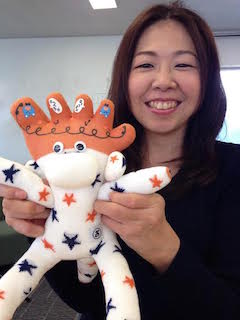 This post is part of an ongoing series detailing the new personas that have been drawn up as part of our Drupal.org user research.
This post is part of an ongoing series detailing the new personas that have been drawn up as part of our Drupal.org user research.
In April of 2014, the Japanese Drupal community gathered in Kyoto for their first ever DrupalCamp. Individuals came from other countries to attend the conference, and that was how Keiko Kanda was first introduced to the project.
“I think it might be a bit unusual to get involved the way I did,” Keiko said. “My cousin who lives in Sydney, Australia, married an Australian man. He came to Japan to attend the DrupalCamp in Kyoto and he asked me to accompany him… though some people were presenting in English, he was concerned that he might need a translator.”
“I knew almost nothing about Drupal, even though he had introduced me to what he was working on at that time. But I thought, I would be glad if I could help him out. So I went to the DrupalCamp in Kyoto and it turned out to be a very interesting experience for me.”
“To be perfectly honest with you, when I decided to tag along with my cousin’s husband, Colin Watson, I didn’t realize how fun it would be. I never thought my involvement would last this long,” Keiko said.
Serving an Immediate Need
At the camp, Keiko quickly found herself enlisted as a translator for some of the sessions, and was surprised by the number of foreign attendees at the conference.
“They were all very nice people, and there was much more international attendance than I expected. There were maybe fifteen or twenty international attendees there, and probably ten or fewer were giving presentations in English. Some were able to give parts of their Drupal explanations in Japanese, but they needed a translator to help introduce themselves. So when I arrived at the venue, the camp organizer asked me to translate the introductions from English to Japanese."
That was how Keiko met Chris Luckhardt, a Drupal Master that we will hear from later in the week.
"Chris was one of the speakers... though he had another translator to translate the technical parts of his presentation, when he spoke about himself and other innocent, casual stuff, he needed someone to translate. So that's how I got involved."
Stayed For the Community
"After the Drupal camp in Kyoto, the organizers — Satoshi Kino and Kyoto Ohtagaki — they asked me to do the translation stuff not only at DrupalCamp but at the meet-ups and meetings. According to them, many Japanese Drupal developers can understand when they read English, but when they have something to express it’s very hard to write or speak whole thing in English.
"Kino-san says it’s hard for Japanese developers to catch up with the latest information on Drupal.org,” Keiko continued, “So he and some other Japanese community members are trying to translate some of the useful English information into Japanese, though it takes time.
"I was — still am — studying to be a translator,” Keiko added, "and I thought it would be a good experience for me to help them. But many of Drupal technical terms... for me, they are gibberish. It’s not a language problem, it’s a problem with Drupal technical terms. So even though at DrupalCamp Kyoto they were talking in Japanese, I often couldn’t understand what they were talking about."
"I refer to Drupal.org occasionally when the community members talk about something very complicated— something about Drupal or what they were doing with Drupal… [translation is] hard for me but it’s fun, and in the process I can learn not only Drupal technical terms, but also what is going on in the Drupal world, learn about the problems the Drupal Japanese community has, and so on."
Ways of Mastering Drupal
When it comes to her current work with Drupal, Keiko is more focused on supporting the CMS than using it.
“When Kino-san organizes Drupal meetings, like monthly meetings, he will post the venue and time and date on Facebook in Japanese, and I will translate that into English and spread the word. When Kino-san or Kyoto-san works with Chris [or other English-speaking Drupal users], I facilitate the meeting on Skype. Though they understand English, it is hard for them to speak in English so I translate from Japanese to English for them."
Keiko has plans to help with translating quite a bit of technical material in the future. She has already agreed to assist Chris Luckhardt with translating a Drupal 8 tutorial video into Japanese, and has volunteered to help translate several books as well. In the meantime, she wishes there was a better way to get ahold of other translators like herself.
“I’m not sure because I’ve never thoroughly searched around Drupal.org, but it would be great if there were resources for people who aren't developers,” Keiko said. “I wish there was a better way to find translators, or event organizers— maybe people who don't create websites but instead help to build the project and the community — not only local communities but worldwide communities too. It would be good if there was a place I could go to find people with experience that might be helpful when organizing DrupalCamps, DrupalCons, and Drupal meetups."
Finding a Common Vocabulary
Keiko has a few other pain points, but they mostly revolve around language.
“As a community member, I think so many challenges I have, are… well, first I’m trying to understand what other community members are talking about as accurately, correctly as I can. That’s the first challenge. And I’m trying to learn more Drupal technical terms so that I can understand people's conversations more easily, but oftentimes… it might appear to be an innocent conversation, but behind the ordinary conversation sometimes there are subtexts… you imagine that someone is talking about an innocent topic but when you try to read between the lines there are implications of bigger problems they have.
“For instance, many people in the Japanese Drupal community are spending incredible amounts of time trying to understand what’s written on Drupal.org, because it’s written in English. It’s my impression — and it might be wrong — that the Japanese Drupal community falls into one of two categories: either they catch up with latest information using Drupal.org frequently, or they are totally left behind, staying within only Japanese-written world, because it is so difficult to read English.
"It’s my impression and opinion too that the Japanese community members are trying to attract more people who maybe did not have anything to do with Drupal, but are good with English. For me, I would be happy to find someone who speaks English and Japanese better than I do... the workload can be overwhelming sometimes, but if I could share the task for someone, that would be very helpful for me. "

Comments
Multi-lingual glossary of Drupal terms
A Multi-lingual glossary of Drupal terms would be a good thing to have for Drupalcamp translators who don't have technical skills.
I didn't see anything like that in a cursory reivew.
https://www.drupal.org/search/site/glossary
https://www.drupal.org/glossary
Thank you!
Multi-lingual glossary of Drupal terms is really useful not only for translation but also for my learning about Drupal. Huge thank you for the information, apologies for my late reply.
Thank you!!!
Thank you for your helpful post. http://mcpebox.com/minecraft-pe-mods/
Drupalコミュニティーの発達に手伝ってありがとうござい
Drupalコミュニティーの発達に手伝ってありがとうございます。
ありがとうございます
これからもDrupalコミュニティーの役に立つように努力していきたいです。Thank you for your comment, it's so encouraging.